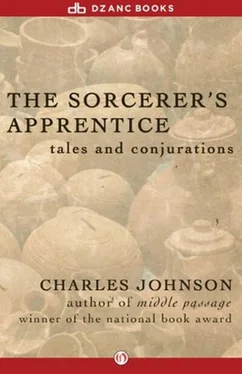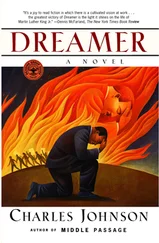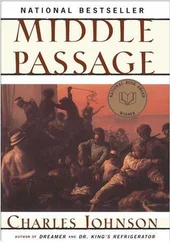Charles Johnson - Sorcerer's Apprentice
Здесь есть возможность читать онлайн «Charles Johnson - Sorcerer's Apprentice» весь текст электронной книги совершенно бесплатно (целиком полную версию без сокращений). В некоторых случаях можно слушать аудио, скачать через торрент в формате fb2 и присутствует краткое содержание. Год выпуска: 2014, Издательство: Dzanc Books, Жанр: Современная проза, на английском языке. Описание произведения, (предисловие) а так же отзывы посетителей доступны на портале библиотеки ЛибКат.
- Название:Sorcerer's Apprentice
- Автор:
- Издательство:Dzanc Books
- Жанр:
- Год:2014
- ISBN:нет данных
- Рейтинг книги:3 / 5. Голосов: 1
-
Избранное:Добавить в избранное
- Отзывы:
-
Ваша оценка:
- 60
- 1
- 2
- 3
- 4
- 5
Sorcerer's Apprentice: краткое содержание, описание и аннотация
Предлагаем к чтению аннотацию, описание, краткое содержание или предисловие (зависит от того, что написал сам автор книги «Sorcerer's Apprentice»). Если вы не нашли необходимую информацию о книге — напишите в комментариях, мы постараемся отыскать её.
Sorcerer's Apprentice — читать онлайн бесплатно полную книгу (весь текст) целиком
Ниже представлен текст книги, разбитый по страницам. Система сохранения места последней прочитанной страницы, позволяет с удобством читать онлайн бесплатно книгу «Sorcerer's Apprentice», без необходимости каждый раз заново искать на чём Вы остановились. Поставьте закладку, и сможете в любой момент перейти на страницу, на которой закончили чтение.
Интервал:
Закладка:
In the weeks, then months that followed Evelyn waited, watching her husband for a flag of surrender. There was no such sign. He became worse than before. He cooked his own meals, called her heavy soul food dishes “too acidic,” lived on raw vegetables, seaweed, nuts, and fruit to make his body “more alkaline,” and fasted on Sundays. He ordered books on something called Shaolin fighting and meditation from a store in California, and when his equipment arrived UPS from Dolan’s Sports in New Jersey, he ordered more — in consternation, Evelyn read the list — leg stretchers, makiwara boards, air shields, hand grips, bokken, focus mitts, a full-length mirror (for heaven’s sake) so he could correct his form, and protective equipment. For proper use of his headgear and gloves, however, he said he needed a sparring partner — an opponent — he said, to help him instinctively understand “combat strategy,” how to “flow” and “close the Gap” between himself and an adversary, how to create by his movements a negative space in which the other would be neutralized.
“Well,” crabbed Evelyn, “if you need a punching bag, don’t look at me.”
He sat across the kitchen table from her, doing dynamic-tension exercises as she read a new magazine called Self . “Did I ever tell you what a black belt means?” he asked.
“You told me.”
“Sifu Chan doesn’t use belts for ranking. They were introduced seventy years ago because Westerners were impatient, you know, needed signposts and all that.”
“You told me,” said Evelyn.
“Originally, all you got was a white belt. It symbolized innocence. Virginity.” His face was immensely serious, like a preacher’s. “As you worked, it got darker, dirtier, and turned brown. Then black. You were a master then. With even more work, the belt became frayed, the threads came loose, you see, and the belt showed white again.”
“Rudolph, I’ve heard this before!” Evelyn picked up her magazine and took it into her bedroom. From there, with her legs drawn up under the blankets, she shouted: “I won’t be your punching bag!”
So he brought friends from his kwoon, friends she wanted nothing to do with. There was something unsettling about them. Some were street fighters. Young. They wore tank-top shirts and motorcycle jackets. After drinking racks of Rainier beer on the front porch, they tossed their crumpled empties next door into Rod Kenner’s yard. Together, two of Rudolph’s new friends — Truck and Tuco — weighed a quarter of a ton. Evelyn kept a rolling pin under her pillow when they came, but she knew they could eat that along with her. But some of his new friends were students at the University of Washington. Truck, a Vietnamese only two years in America, planned to apply to the Police Academy once his training ended; and Tuco, who was Puerto Rican, had been fighting since he could make a fist; but a delicate young man named Andrea, a blue sash, was an actor in the drama department at the university. His kwoon training, he said, was less for self-defense than helping him understand his movements onstage — how, for example, to convincingly explode across a room in anger. Her husband liked them, Evelyn realized in horror. And they liked him. They were separated by money, background, and religion, but something she could not identify made them seem, those nights on the porch after his class, like a single body. They called Rudolph “Older Brother” or, less politely, “Pop.”
His sifu, a short, smooth-figured boy named Douglas Chan, who Evelyn figured couldn’t be over eighteen, sat like the Dalai Lama in their tiny kitchen as if he owned it, sipping her tea, which Rudolph laced with Korean ginseng. Her husband lit Chan’s cigarettes as if he were President Carter come to visit the common man. He recommended that Rudolph study T’ai Chi, “soft” fighting systems, ki, and something called Tao. He told him to study, as well, Newton’s three laws of physics and apply them to his own body during kumite. What she remembered most about Chan were his wrist braces, ornamental weapons that had three straps and, along the black leather, highly polished studs like those worn by Steve Reeves in a movie she’d seen about Hercules. In a voice she thought girlish, he spoke of eye gouges and groin-tearing techniques, exercises called the Delayed Touch of Death and Dim Mak, with the casualness she and Shelberdine talked about bargains at Thriftway. And then they suited up, the boyish Sifu, who looked like Maharaj-ji’s rougher brother, and her clumsy husband; they went out back, pushed aside the aluminum lawn furniture, and pommeled each other for half an hour. More precisely, her Rudolph was on the receiving end of hook kicks, spinning back fists faster than thought, and foot sweeps that left his body purpled for weeks. A sensible man would have known enough to drive to Swedish Hospital pronto. Rudolph, never known as a profound thinker, pushed on after Sifu Chan left, practicing his flying kicks by leaping to ground level from a four-foot hole he’d dug by their cyclone fence.
Evelyn, nibbling a Van de Kamp’s pastry from Safeway — she was always nibbling, these days — watched from the kitchen window until twilight, then brought out the Ben-Gay, a cold beer, and rubbing alcohol on a tray. She figured he needed it. Instead, Rudolph, stretching under the far-reaching cedar in the backyard, politely refused, pushed the tray aside, and rubbed himself with Dit-Da-Jow, “iron-hitting wine,” which smelled like the open door of an opium factory on a hot summer day. Yet this ancient potion not only instantly healed his wounds (said Rudolph) but prevented arthritis as well. She was tempted to see if it healed brain damage by pouring it into Rudolph’s ears, but apparently he was doing something right. Dr. Guylee’s examination had been glowing; he said Rudolph’s muscle tone, whatever that was, was better. His cardiovascular system was healthier. His erections were outstanding — or upstanding — though lately he seemed to have no interest in sex. Evelyn, even she, saw in the crepuscular light changes in Rudolph’s upper body as he stretched: Muscles like globes of light rippled along his shoulders; larval currents moved on his belly. The language of his new, developing body eluded her. He was not always like this. After a cold shower and sleep his muscles shrank back a little. It was only after his workouts, his weight lifting, that his body expanded like baking bread, filling out in a way that obliterated the soft Rudolph-body she knew. This new flesh had the contours of the silhouetted figures on medical charts: the body as it must be in the mind of God. Glistening with perspiration, his muscles took on the properties of the free weights he pumped relentlessly. They were profoundly tragic, too, because their beauty was earthbound. It would vanish with the world. You are ugly, his new muscles said to Evelyn; old and ugly. His self-punishment made her feel sick. She was afraid of his hard, cold weights. She hated them. Yet she wanted them, too. They had a certain monastic beauty. She thought: He’s doing this to hurt me . She wondered: What was it like to be powerful? Was clever cynicism — even comedy — the by-product of bulging bellies, weak nerves, bad posture? Her only defense against the dumbbells that stood between them — she meant both his weights and his friends — was, as always, her acid southern tongue:
“They’re all fairies, right?”
Rudolph looked dreamily her way. These post-workout periods made him feel, he said, as if there were no interval between himself and what he saw. His face was vacant, his eyes — like smoke. In this afterglow (he said) he saw without judging. Without judgment, there were no distinctions. Without distinctions, there was no desire. Without desire…
Читать дальшеИнтервал:
Закладка:
Похожие книги на «Sorcerer's Apprentice»
Представляем Вашему вниманию похожие книги на «Sorcerer's Apprentice» списком для выбора. Мы отобрали схожую по названию и смыслу литературу в надежде предоставить читателям больше вариантов отыскать новые, интересные, ещё непрочитанные произведения.
Обсуждение, отзывы о книге «Sorcerer's Apprentice» и просто собственные мнения читателей. Оставьте ваши комментарии, напишите, что Вы думаете о произведении, его смысле или главных героях. Укажите что конкретно понравилось, а что нет, и почему Вы так считаете.












